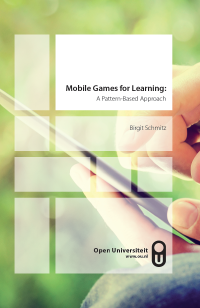 Hochschulschrift (Dissertation)
Hochschulschrift (Dissertation)
Open Universiteit in the Netherlands, Heerlen (NL), 2014
ISBN: 978 949 18253 85
URL: http://dspace.learningnetworks.org/handle/1820/5833 (last check 2015-03-19)
Today, pupils at the age of 15 have spent their entire life surrounded by and interacting with diverse forms of computers. It is a routine part of their day-to-day life and by now computer-literacy is common at very early age. Over the past five years, technology for teens has become predominantly mobile and ubiquitous within every aspect of their lives. To them, being online is an implicitness. In Germany, 88% of youth aged between 12-19 years own a smartphone and about 20% use the Internet via tablets. Meanwhile, more and more young learners bring their devices into the classroom and pupils increasingly demand for innovative and motivating learning scenarios that strongly respond to their habits of using media. With this development, a shift of paradigm is slowly under way with regard to the use of mobile technology in education. By now, a large body of literature exists, that reports concepts, use-cases and practical studies for effectively using technology in education. Within this field, a steadily growing body of research has developed that especially examines the use of digital games as instructional strategy.
The core concern of this thesis is the design of mobile games for learning. The conditions and requirements that are vital in order to make mobile games suitable and effective for learning environments are investigated. The base for exploration is the pattern approach as an established form of templates that provide solutions for recurrent problems. Building on this acknowledged form of exchanging and re-using knowledge, patterns for game design are used to classify the many gameplay rules and mechanisms in existence. This research draws upon pattern descriptions to analyze learning game concepts and to abstract possible relationships between gameplay patterns and learning outcomes. The linkages that surface are the starting bases for a series of game design concepts and their implementations are subsequently evaluated with regard to learning outcomes. The findings and resulting knowledge from this research is made accessible by way of implications and recommendations for future design decisions.
Schüler im Alter von 15 Jahren haben ihr ganzes Leben umgeben von und in Interaktion mit verschiedensten Formen von Computern verbracht. Die Technologie die sie umgibt ist mittlerweile überwiegend mobil und durchdringt fast jeden ihrer Lebensbereiche. Die 12 – 19 jährigen Jugendlichen in Deutschland sind fast alle (88 %) im Besitz eines eigenen internetfähigen Smartphones mit Touchscreen und jeder fünfte besitzt mittlerweile einen eigenen Tablet-PC. Die Mobiltechnologie hält damit auch Einzug in das Klassenzimmer. Und das mit Folgen: Der Ruf nach innovativen und motivierendem Lernszenarien, die sich an den Mediennutzungsgewohnheiten der Jugendlichen orientieren, wird immer lauter. Auf der Bildungsebene kommt langsam ein Paradigmenwechsel in Gang, der die Nutzung mobiler Technologien für das Lernen stärker einbezieht. Lernunterstützende Formen mobiler Technologien umfassen Möglichkeiten zu Partizipation und Kollaboration wie das Social Web sie bietet, oder die Nutzung von Umgebungsinformationen und Kontextualisierung durch Spiele.
Diese Arbeit nimmt die Entwicklung mobiler Lernspiele in den Fokus. Sie untersucht, welche Bedingungen und Anforderungen gegeben sein müssen, damit der Einsatz mobiler Spiele lernwirksam ist im Sinne einer Unterstützung affektiver und kognitiver Lernziele. Ausgangsbasis für die Untersuchungen ist der ursprünglich aus der Architekturtheorie stammende Pattern-Ansatz der generativ ist und analytisch die Dimensionen Kontext, Problemfeld und Lösung erfasst. In Übertragung auf bestehende Game-Design Patterns, nutzt diese Forschung Analysen und experimentelle Ansätze, um mögliche Zusammenhänge zwischen Spielmechanismus und Lernergebnis zu identifizieren. Dazu wurden im Rahmen dieser Arbeit eine Reihe von mobilen, lernzielorientierten Spielansätzen entwickelt und im Hinblick auf eine bestehende Lernzielklassifizierungen evaluiert. Neben exemplarischen und evaluierten Lernspielkonzepten sind ein Referenzmodell zur Bewertung von bestehenden Spielansätzen und Evaluationsergebnisse zur Unterstützung zukünftiger Spieldesign-Entscheidungen die wesentlichen Forschungsbeiträge dieser Arbeit.